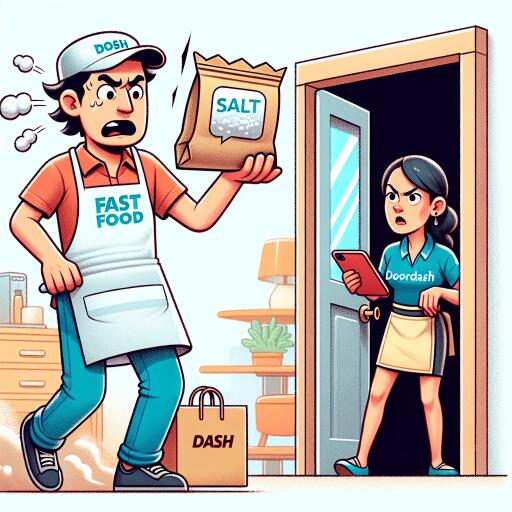Exposing the Scam: How Fast-Food Single Orders Can Be a Trap for DoorDash Drivers
In the bustling world of food delivery, drivers navigate not just the physical obstacles of traffic and tricky addresses but also the less visible hurdles of cybersecurity threats. The latter is receiving more attention thanks to a former DoorDash driver’s revelation on social media. What might seem like a bizarre request for a single packet of salt or a solitary cookie, could, in fact, be a scam targeting unsuspecting drivers.
Brittany, a former DoorDash deliverer, shared her experience in a TikTok video, shedding light on a scam that could potentially rob drivers of their earnings. Her story begins with an order that seemed harmless enough: a single cookie from McDonald’s. “I thought that was just all so funny,” she recalls, noting the excessive packaging for such a small item. Yet, the situation quickly took a suspicious turn when the customer claimed to be at a different location and requested to cancel the order.
Shortly after, Brittany received a call from someone claiming to be DoorDash Support, instructing her to cancel the order in a specific way to ensure she would be paid. This so-called support staff then asked Brittany for a code that had been sent to her account, a move that she would soon regret. “The text literally says don’t share the code lmao,” Brittany mentioned, realizing her mistake too late. The scammers, posing as DoorDash Support, had aimed to access her account and steal her earnings.
Fortunately for Brittany, her funds were not stored directly in the app but on a separate DoorDash card, preventing the scammers from accessing her money. “Luckily, I have that DoorDash card, and my money goes straight to that,” she explained. This incident highlights a broader issue: scammers use minimal orders as a way to engage with drivers directly, the end goal being to infiltrate their accounts.
The engagement from Brittany’s video reflects a mix of concern, advice, and relief that the scam didn’t succeed. Viewers shared their suggestions, such as insisting on communication through the app only and being extremely cautious with unsolicited calls claiming to be support. “Never share your phone number… communicate only thru the app,” one commenter advised, emphasizing the importance of protecting one’s personal information.
Interestingly, some users confessed to making single-item orders themselves, not with the intention of scamming, but due to simple errors or unique circumstances. “I accidentally ordered just cheese from DoorDash,” one user wrote, explaining a mishap while trying to customize a cheeseburger order. Another shared how they ordered a single cookie to test if their account was still active, expressing concern that their innocent action could be misconstrued.
This revelation serves as a wake-up call not just for delivery drivers but also for the platforms that facilitate these transactions. As the gig economy grows, ensuring the safety and security of those who power these services becomes increasingly critical. It’s a reminder to maintain vigilance and to scrutinize those “small” orders that might not be as innocent as they appear.
As for Brittany, her experience serves as a cautionary tale to others in the delivery industry. It underscores the importance of following platform protocols and never sharing sensitive information, no matter how legitimate a request might seem. Fast-food giants and delivery platforms alike may need to consider additional measures to prevent these kinds of scams from occurring or at least make it harder for scammers to exploit hardworking drivers.
In the evolving landscape of online food delivery, staying one step ahead of scammers requires both awareness and education. Stories like Brittany’s illuminate the darker corners of the gig economy, prompting a collective effort to protect its workforce. After all, the goal is to ensure that a simple delivery remains just that, without hidden risks or unwelcome surprises.










